

Index. L'Intelligence Artificielle… avec intelligence ! DEEP LEARNING · Deep Learning. 1.0 - Table of Contents.ipynb - Colaboratory. ML - hands-on 1 : Discover pandas, a useful library for treating tabular data.
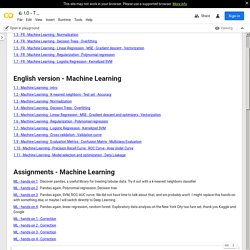
Try it out with a k-nearest neighbors classifier ML - hands-on 2 : Pandas again, Polynomial regression, Decision tree ML - hands-on 3 : Pandas again, SVM, ROC-AUC curve. We did not have time to talk about that, and we probably won't. I might replace this hands-on with something else, or maybe I will switch directly to Deep Learning. 16. Learning: Support Vector Machines. MIT 6.S191: Introduction to Deep Learning. Deep Learning course: lecture slides and lab notebooks. This course is being taught at as part of Master Datascience Paris Saclay Table of contents The course covers the basics of Deep Learning, with a focus on applications.
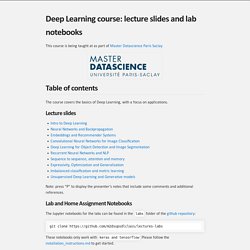
Lecture slides Note: press “P” to display the presenter’s notes that include some comments and additional references. Lab and Home Assignment Notebooks The Jupyter notebooks for the labs can be found in the labs folder of the github repository: git clone These notebooks only work with keras and tensorflow Please follow the installation_instructions.md to get started. Direct links to the rendered notebooks including solutions (to be updated in rendered mode): Depth First Learning. AI Materials. Intro to Deep Learning with PyTorch. Open Machine Learning Course mlcourse.ai. Learn data science with Python and R projects. Masinõpe - Kursused - Arvutiteaduse instituut. I.
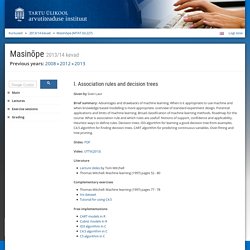
Association rules and decision trees Given by Sven Laur. A Course in Machine Learning. COMS W4721 Machine Learning for Data Science. @ 422 Mudd BuildingSynopsis: This course provides an introduction to supervised and unsupervised techniques for machine learning.
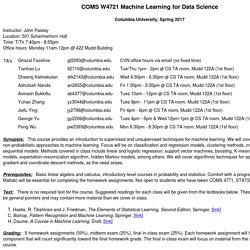
We will cover both probabilistic and non-probabilistic approaches to machine learning. Focus will be on classification and regression models, clustering methods, matrix factorization and sequential models. Methods covered in class include linear and logistic regression, support vector machines, boosting, K-means clustering, mixture models, expectation-maximization algorithm, hidden Markov models, among others. Deep Learning Course. ⇢ François Fleuret You can find here the materials for the EPFL course EE-559 “Deep Learning”.
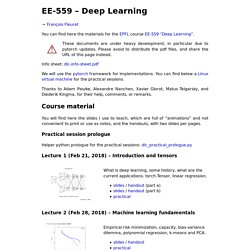
These documents are under heavy development, in particular due to pytorch updates. Please avoid to distribute the pdf files, and share the URL of this page instead. Info sheet: dlc-info-sheet.pdf We will use the pytorch framework for implementations. Thanks to Adam Paszke, Alexandre Nanchen, Xavier Glorot, Matus Telgarsky, and Diederik Kingma, for their help, comments, or remarks. Course material You will find here the slides I use to teach, which are full of “animations” and not convenient to print or use as notes, and the handouts, with two slides per pages.
Practical session prologue Helper python prologue for the practical sessions: dlc_practical_prologue.py. Applied AI with DeepLearning, IBM Watson IoT Data Science Certificate. CS231n Convolutional Neural Networks for Visual Recognition. Education. MIT 6.S094: Deep Learning for Self-Driving Cars.
CS446: Fall 2017 - RELATE. Course Description The goal of Machine Learning is to build computer systems that can adapt and learn from their experience.
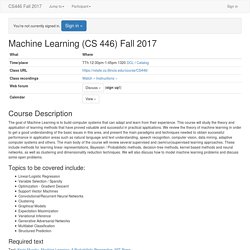
This course will study the theory and application of learning methods that have proved valuable and successful in practical applications. We review the theory of machine learning in order to get a good understanding of the basic issues in this area, and present the main paradigms and techniques needed to obtain successful performance in application areas such as natural language and text understanding, speech recognition, computer vision, data mining, adaptive computer systems and others. The main body of the course will review several supervised and (semi/un)supervised learning approaches. Syllabus. The Spring 2020 iteration of the course will be taught virtually for the entire duration of the quarter.
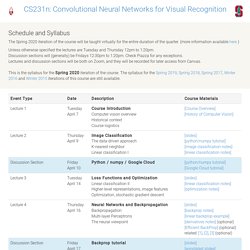
(more information available here ) Unless otherwise specified the lectures are Tuesday and Thursday 12pm to 1:20pm. Discussion sections will (generally) be Fridays 12:30pm to 1:20pm. Check Piazza for any exceptions. Lectures and discussion sections will be both on Zoom, and they will be recorded for later access from Canvas. This is the syllabus for the Spring 2020 iteration of the course. Every single Machine Learning course on the internet, ranked by your reviews. Unsupervised Feature Learning and Deep Learning Tutorial. Machine Learning. About this course: Machine learning is the science of getting computers to act without being explicitly programmed.
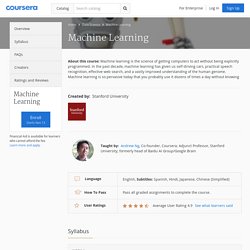
In the past decade, machine learning has given us self-driving cars, practical speech recognition, effective web search, and a vastly improved understanding of the human genome. Machine learning is so pervasive today that you probably use it dozens of times a day without knowing it. Many researchers also think it is the best way to make progress towards human-level AI. In this class, you will learn about the most effective machine learning techniques, and gain practice implementing them and getting them to work for yourself. More importantly, you'll learn about not only the theoretical underpinnings of learning, but also gain the practical know-how needed to quickly and powerfully apply these techniques to new problems. Practical Deep Learning For Coders—18 hours of lessons for free. AI Materials. Recommended Lecture Videos We recommend watching the following set of lecture videos: Additionally, there are additional Step-By-Step videos which supplement the lecture's materials.
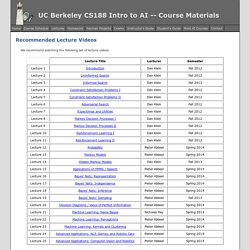
These videos are listed below: Per-Semester Video Archive The lecture videos from the most recent offerings of CS188 are posted below. Spring 2014 Lecture Videos Fall 2013 Lecture Videos Spring 2013 Lecture Videos Fall 2012 Lecture Videos Spring 2014 Fall 2013 Spring 2013 Fall 2012. Artificial Intelligence. Unit-1 INTRODUCTION. Foundations of Artificial Intelligence 2 Intelligent Agents – Agents and environments Good behavior – The nature of environments. - ppt download.
IDEAL MOOC. Implementation of DEvelopmentAl Learning - Free Massive Open Online Course - from October 13th to December 7th 2014.
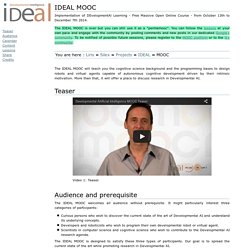
The IDEAL MOOC is over but you can still use it as a "permamooc". You can follow the lessons at your own pace and engage with the community by posting comments and new posts in our dedicated Google+ community. To be notified of possible future sessions, please register to the MOOC platform or to the G+ community. The IDEAL MOOC will teach you the cognitive science background and the programming bases to design robots and virtual agents capable of autonomous cognitive development driven by their intrinsic motivation.
More than that, it will offer a place to discuss research in Developmental AI. The IDEAL MOOC welcomes all audience without prerequisite. Curious persons who wish to discover the current state of the art of Developmental AI and understand its underlying concepts. The IDEAL MOOC is designed to satisfy these three types of participants.